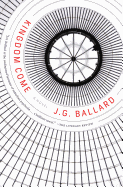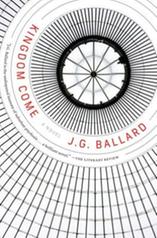

Richard Pearson arrives in Brooklands after his father is killed by a lone gunman in a mall shooting, only to learn that the primary suspect has been released based on the testimony of prominent eyewitnesses. He smells a rat and, wondering if there's a conspiracy that's somehow related to the town's nationalistic undercurrent of racism, he decides to stick around and investigate.
Ballard isn't especially interested in subtlety here; his characters just come right out and say things like, "Consumerism is about a lot more than buying things.... It's our main way of expressing our tribal values." A psychiatrist Pearson suspects of being in on the plot, whatever the plot is, drives the message home, projecting "elective psychopathy" as a path out of the boredom that comes with prosperity's fulfillment of material ambitions. "The consumer society is a kind of soft police state," he declares. "We think we have choice, but everything is compulsory. We have to keep buying or we fail as citizens."
Kingdom Come is less concerned with its story than with its themes; Pearson's vacillating personality sometimes seem to defy emotional logic for the sake of extending Ballard's opportunities to jab at high consumerism. And, honestly, describing the mall's sound system playing "a sweetened reworking in the Mantovani idiom of the Horst Wessel song" as ambient music is laying it on just a bit thick. That said, Kingdom Come works better as a story than Millennium People and Ballard's other fiction from this period and, in a way, the Metro Centre shopping mall of this final novel becomes a reworking of the eponymous luxury skyscraper in Ballard's classic High Rise (1975) pushed in an equally surreal and violent direction.
The Collins English Dictionary defines "Ballardian" as dealing with "dystopian modernity, bleak man-made landscapes and the psychological effects of technological, social or environmental developments." Kingdom Come is all that and then some--a fitting capstone to the Ballard legacy. --Ron Hogan
Shelf Talker: Like William Gibson, Ballard's late fiction looked at the cutting edge of contemporary society with a science fiction writer's critical, extrapolative eye.

